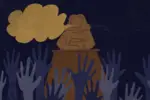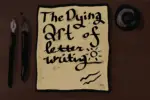Recently, as I was wading through a cluttered swamp of old paperwork, I came across a letter from 2012. From me, to me. In the letter I did everything one does in a letter to one’s future self: detailed the excitement and mishaps of that year — in my case, the furor of sixth grade — before enumerating my hopes for the future.
As I read, it became clear many of my circumstances had changed, with several dreams lost within the walls of my middle school. Rather than disappointment over a few forgotten goals (alas, I did not become a professional tennis player), I felt a sort of serene curiosity; my life is far from how I pictured it eight years ago. I am more familiar with the world, its secrets, and its evils.
I am, in many ways, a different person. Yet many of my perceptions of good character remain the same. With my simple, sixth grade diction, I plainly stated the person I wanted to be. And most, if not all, of those statements hold true. My 11-year-old self knew and reminded me of the answers to many of the questions I ask today.
A simplified take on my life purpose is just one bonus of this correspondence with my past self. Along with an amused acceptance of my unreached aspirations, I experienced vivid nostalgia as I recalled my blissful unawareness of the incoming curve balls that would knock me off my firm, naive footing and open my eyes to the real world. I finished the letter thinking about how I had grown, feeling like an older sister to my younger self, and wishing I could give her advice.
The letter got me thinking about the reasons for writing such a letter, and what I would want to say in a letter I wrote today. After some thought, I settled on writing one in the opposite direction in time, to a certain me of the past, and then another to my future self.
You, too, should write yourself before the end of this summer. This year, you are sure to not run short of topics to address in your letters. You will inevitably have a lot to say about this year for the rest of your life. In writing your letter to your younger self, you will find yourself feeling like an old sage, offering words of solace for current issues and advice for the obstacles to come. Your letter to your future self is an opportunity to write down the notions that ground you and to be truthful about your current situation: the progress you have made and the inner discord you endure.
A Letter to a Younger You
Find an age at which you could have used a bit of guidance. For me, it was age 15, specifically in November of 2016, as I was consumed by a sport I detested, and flustered by the victory of erratic and menacing national leadership.
Touch lightly on the delicate subjects of your past. As bad as things may look, you’ll make it out okay. Advise yourself to let go of your hunt for perfection; it will push happiness away from you eternally and unconditionally. “Don’t forget to prioritize your health,” you should say.
Tell yourself about the goals you did accomplish, and those you did not. Your triumphs and your debilitating failures. In many ways you are not the person you had hoped you’d be — in some ways, however, you are better.
In reality, a letter to your past self is not for your past self — unfortunately, mail still cannot travel back in time. A letter to your past self is really for you now. It can be an account of your take on and participation in historical events. It can encourage acknowledgement of and respect for a change of plans, and it can be a reflection of the turns, falls and comebacks you’ve sustained. It will require a level of wisdom that is so personalized, you will never find it in a self-help book or any online article (such as this). It could be a personal resource for responding sensitively to a younger person’s plight.
A Letter to an Older You
In writing a letter to my future self, I wondered if there was any point jotting down my hopes for the future; what if, like a few of my 11-year-old goals, they go unfulfilled? Am I setting myself up to be let down — by myself? But I remembered how little those shortfalls mattered when I read that first letter.
I realized a letter to my future self was an opportunity to reiterate my values in a new context. Rather than listing hopes for a well-paying job, a big family and a nice house, I will write to ask if I am happy, if I am living selflessly, if I am learning, and growing, and accepting.
Many days, people wish to go back to a certain age, back “when life was easy,” when problems were trivial. A letter to your future self can act as a reminder that internal conflicts and difficulties exist at all stages of life. At age 11, for example, problems I retrospectively consider inconsequential weighed heavily on my fledgling mind.
Likewise, my dilemmas of today may be downplayed by myself in 20 years. Indeed, sometimes you might hear older generations reflect on their college years with idealistic undertones. Those years were the “best of [their lives],” many insist.
It seems they rarely remember, however, the days or months in those years when life did not feel so spectacular. This is your chance to get in closer touch with today and tomorrow, the days upon which one day you may gaze back wistfully. It is your chance to tell your future self to do the same: to cherish moments rather than to wish for those lost in time.
Hopefully when I am adrift in the next phase of my life, I will stumble upon a forgotten letter, one that may as well be from someone else. I will be reminded of the life philosophies I’ve held since I was 11, those regarding kindness, open-mindedness and the pursuit of happiness. Many of the realities detailed in the letter will be long gone; I will recall the struggles of my 18-year-old self with sympathy and with a new level of insight. Perhaps I will write back and share my thoughts.
















